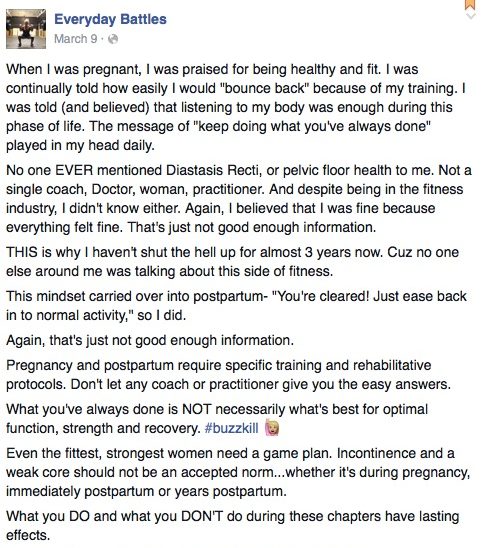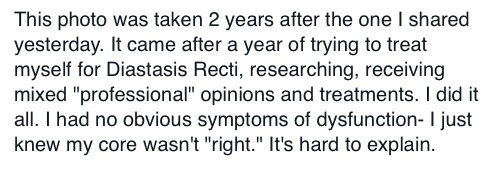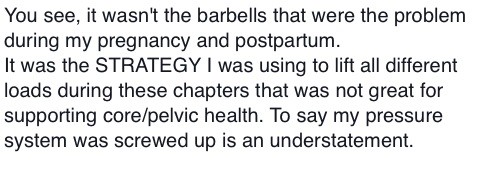I love seeing videos that show women being badass and lifting weights, as it inspires me, but this is a little high risk in my opinion. I am all for working out while pregnant, this type of training while pregnant is not the norm.
Many shun and vilify this type of training while pregnant through social media channels. The main criticism is fear for the safety of the baby, however, my biggest concern is for the mom. She is well obviously well trained in weightlifting and Olympic powerlifting type moves, however she is not immune to pregnancy side effects such as clumsiness, balance issues, ligaments being looser resulting in possible injuries, and pelvic floor issues. Also when I see girls who are near the end of a pregnancy doing plyometrics, especially burpees, or box jumps, I cringe.
Obviously no one starts at this level of training. Baby on board or no baby.
My question to those who do crossfit wods or Olympic lifting while pregnant: What is the benefits of training like this vs something a bit more moderate during your pregnancy?
Perhaps for her this is moderate training, as the training load (the weight you use on the bar or dumbbell) is always relative to the person and their current strength levels. But if you pair this with the shift in bodyweight distribution, resulting in a shift her posture, weakening abdominals, more pressure/strain on the lower back due to the being so front heavy, lumbar lordosis paired with anterior pelvic tilt, and extra pressure on her pelvic floor, I just don’t see the benefits.
Remember she is at the elite level and should not be viewed to make YOU feel bad about yourself because she lifts while pregnant, and you choose not too while pregnant or any other time in your life.
Once the baby is born, it would risky to return to the exact same load, intensity and frequency of lifting she did prior to giving birth. During the pregnancy, she has progressively strengthened her core and physique with huge load in the front of her body. After giving birth she is now in a unfamiliar body and she would need time to recalibrate her lifting, just as they had had during the pregnancy. After a period of recovery, posture once again has to shift back to normal, her core and pelvic floor strengthened with no baby inside her, and watch for other post baby issues such as diastasis recti (separation of the rectus abdominus), incontinence, prolapse, or any healing that is not happening.
Another poster on facebook, Olympic lifter while being pregnant, wrote of the often unspoken recovery that needs to happen with the pelvic floor post birth.

I love seeing women lift while pregnant. In fact, I encourage my clients who are pregnant to lift as long as they feel well to do so. The general rule is ‘do what you have been doing’. So if you have been lifting continue to do so. However, pushing the limits while pregnant, to simply prove a point about health, and being fit while pregnant, puts the mom at greater risk for the above mentioned post partum issues, and my point is – why take the risk?
Case in point (n=1) is this poster on facebook, who wrote a follow up to her post on pelvic floor issues post birth. So she was a long time lifter, coached others on lifting, and still she was not immune to a variety of post baby issues that could arise. By her own admission spoke of deficits in her lifting technique that was present prior to getting pregnant which included improper activation of her core/pelvic floor during lifting. She thought she was okay, progressively re-entering into training post birth, and realized a few years later, that she was not okay.


So what is the take away message from this post?
- Lifting technique is always essential. This includes learning and knowing proper engaging and bracing the core while lifting. If you are not sure, seek out a coach to help you.
- Weigh the benefits vs the risks of training hard and heavy while pregnant. Listen to your body is a good guideline but many who are very well tuned into their own bodies can make mistakes. Er on the side of doing less. Work the technique vs the load.
- Post pregnancy health/rehabilitation of your core and pelvic floor is essential to continuing your lifting career. Even if you are evaluated, and then given the ok to return to lifting, most likely your body is not ready in the recommended 6-8 weeks after giving birth. Sure there are exceptions, and they are probably not you.
- Progressive re-entry into lifting post pregnancy. Back off with the load and slowly start building back up. Don’t try to be a superhero (even though you are a mom) in a week or two. You know this stuff takes time. You body will thank you for it.
- Never feel bad about yourself or compare yourself to others if you cannot lift all the way to the end of your pregnancy. Each pregnancy is very different, each woman has their own pregnancy story to write, and be proud of your journey. Training or no training. You can always get back to you, after the birth of the baby.
Allison Ethier is an online trainer and contest prep coach. She also trains clients early am at Excellence Fitness Facility in Quebec, Canada. With over 16 years of competitive experience in fitness, she specializes in fat loss, muscle gain, and guiding individuals to their perfect body.
- Fat loss
- Muscle Gain
- Contest Prep
- Nutritional guidance
- Contest posing: Fitness, Figure, and Bikini
Feel free to contact me here:
[iphorm id=”4″ name=”Contact Form”]

